

The Goa State Commission for Protection of Child Rights, in collaboration with the Directorate of Education, successfully organised a capacity-building programme for nodal teachers and club leaders of anti-drugs clubs from schools in Mormugao taluka on Thursday, January 18, at 1930 Vasco.
The event aimed to equip educators and mentors with the necessary knowledge and tools to effectively combat substance abuse among the youth.
The programme, attended by 140 participants, including nodal teachers and student leaders of the Prahari Clubs from all schools, was made possible with the generous support of the National Institute of Social Defence, New Delhi, and NRB Group, Vasco.
The programme featured speakers who shared valuable insights into understanding the dynamics of substance abuse and strategies for effective prevention within school settings. Dr Rajesh Dhume and Dr Priyanka from Addiction Treatment Facility, North Goa District Hospital addressed the audience, emphasising the importance of proactive measures in tackling substance abuse issues.
Dr Kashyap Bandodkar, Junior Resident, GDCH shed light on critical topics related to tobacco control, urging young minds to make smart choices and avoid initiating harmful habits.
Dr Akshatha Gadiyar, Assistant Professor, GDCH, discussed lesser-known facts about e-cigarettes, educating participants on the potential risks associated with these devices.
Peter F Borges, Chairperson of the Goa State Commission for Protection of Child Rights, elaborated on the role of Prahari Clubs in safeguarding children and promoting a drug-free environment.
To make Goa free from drugs, it's important to give power and knowledge to young people. Students are like the leaders in making this happen and keeping our state safe from drugs
Peter F Borges, Chairperson, Goa SCPCR
He highlighted the importance of students' engagement in this endeavor and underscored the significant role educators and mentors play in protecting children from the scourge of substance abuse.
“To make Goa free from drugs, it's important to give power and knowledge to young people. Students are like the leaders in making this happen and keeping our state safe from drugs,” Peter F Borges, Chairperson, Goa SCPCR said.
Salim Shaikh, Deputy Superintendent of Police, Vasco, shared insights into the role of law enforcement agencies in curbing substance abuse. He earnestly called upon children to actively support supply reduction initiatives, instilling in them a sense of responsibility and cooperation among the youth.
The capacity-building programme not only provided valuable information but also served as a platform for networking and collaboration among educators, club leaders, and law enforcement officials. It reinforced the collective commitment to creating a safe and drug-free environment for Goa's youth.